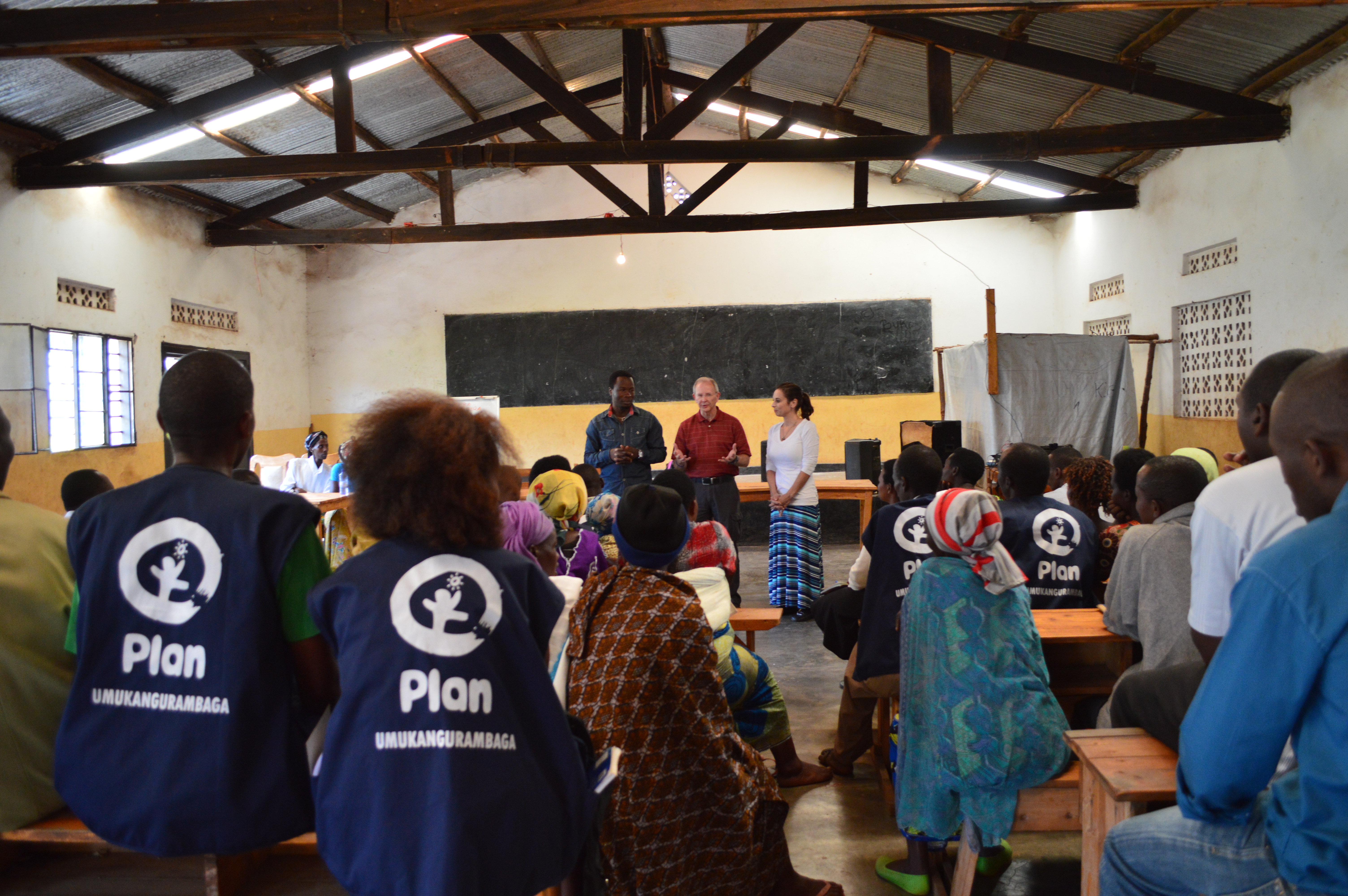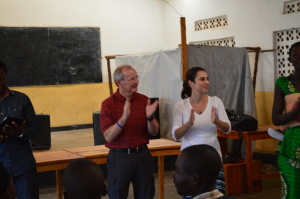
Our bus was directed to a narrow parking space close by a gathering hall where we were to meet with a group of refugee camp leaders and officials. As more and more children and curious adults began to press in on our vehicle, we became aware of the enormity of what lay ahead. I, for one, began to feel a little overwhelmed. The camp was much larger than we had been told. Far more people. Far more children. Far more need. Perhaps more than a little overwhelmed.
Photo Credit: Betty Gilmore
Relief workers directed us to step out of the bus. The crowds parted at their direction and our team made its way through the masses single file. We stuck close to our guide in this experience, Benjamin Nkusi, the national coordinator for ALARM Rwanda.
Inside the meeting place, a group of 40 to 50 adults were seated along with just as many children. Quietly watching us, over 100 pair of eyes were bright and expectant . . . hopeful.
As seems to be customary in our Rwandan experience, our team was seated as a panel at tables at the front of the room — places of prestige for the opening ceremonies that were to come. Leaders among the people in the refugee camp, along with officials from the camp administration, were seated there, as well.
Two more groups of children were ushered in — maybe three. Before all was said and done, 213 little ones had been hand-selected to interact with us.
Our friend, Ben, made our introductions and explained our purpose in coming. Four of our team members (Aaron, Robyn, Malcolm and Dan with the assistance of Ben) would spend time with the children, while Betty and I would be left with the adults for a time of special training on trauma and compassion fatigue. Eli, the business development coordinator for ALARM Rwanda, would serve as our interpreter. The ever-smiling Eli was surprised to learn of his role in our presentation, but stepped up and did a marvelous job.
As Betty and I watched the camp workers herd the children out the back door and watched our team members follow, I again felt overwhelmed. We had thought that our training time would be with camp social workers and officials. However, the group we faced had some of those people, but about half appeared to be camp dwellers.
In the moments before we started, there was a certain amount of clamor as tables were set up to the side of the room and as goods and crafts were set out on display. We had been told that we would have the opportunity to purchase goods from some of the people and the marketplace was being readied.
The original plan, the one that pinpointed social workers and officials as our audience, called for four hours of training. I was to bring a lesson on servant leadership while Betty was scheduled to speak on trauma, self-care and compassion fatigue. Frankly, I wasn’t sure that I could teach these dedicated and selfless people anything about servant leadership. Thus, I was a little relieved to learn that our time was to be shortened — a little more than hour for the entire training.
Betty and I reconfigured our outline. I stepped forward to open the session with some spiritual connections. Then, things began going very well.
I would tell Betty later that it brought tears to my eyes to see the way that she worked with these people. That was made more difficult as we worked through Eli as interpreter. Yet, Betty won these people over. Soon, they were telling their stories and sharing ways that they believed they could help each other through their present difficulties.
Several women told of being chased from their homes with their children. Forced to flee from the Democratic Republic of Congo, they had made their way across the border into Rwanda and had eventually been directed to the camp. With nothing but the few possessions they could carry on their backs, these little families were building a new life under conditions that most of us in the Western world cannot imagine. Most of them had lost loved ones to violence.
And Betty listened carefully to them. She reassured them. She affirmed them. And she encouraged them. Betty was awes0me.
One of the women spoke of how important it was to come together with other women — undoubtedly widows or, at the very least, women separated from their husbands — to talk, to work on their crafts, and to sing.

In my closing thoughts, I congratulated them on their determination and spirit — and I asked them to sing. And they did! (The pictures on this post were taken by a camp official and were carefully framed in order to prevent identification of the refugees.) It was marvelous to hear the joyous noise! But, again I was overwhelmed.
Just as we completed our time, team members began to return along with the children. We could tell from our comrades’ faces that something was wrong. (That will be the topic of the next post.)
But we later learned that, for a little over an hour, they had begun to establish a kinship with those 213 children.
Ben addressed the adults and the children again in Kinyarwandan and then instructed us to gather our things to leave. We were headed toward the door when we were reminded that the refugee marketplace was open to us.
We shopped for about ten minutes. Crocheted items, soda pop, soap, baskets were purchased and, I’m certain, far too many Rwandan francs were given. But it wasn’t about fair dealing. It was all about providing a little something from those who had much to those who were in need.
Then, things began to unravel just a bit. All of the children had gathered around us as we shopped. And now, by the dozens they were approaching each of us and using a substantial part of their English.
“Give me money! Give me money!”
The camp social workers moved in, separating us from the children and directed us to make our way toward the bus. Through the bedlam outside, we were pushed that way. Onboard the bus, the door shut behind us. I couldn’t help but notice as I made my way to my seat, that the duffel bags with the donations were still in the back.
The bus edged its way through the crowds and slowly made its way down the hill and out of the camp.
And the kids ran alongside.
And we were overwhelmed.
